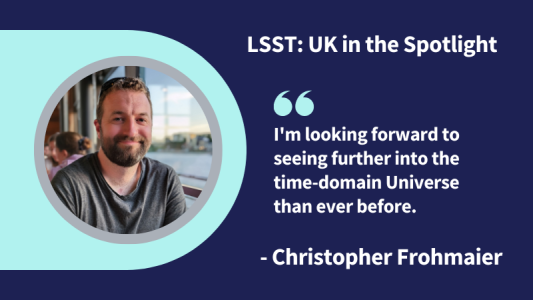In the Spotlight: Christopher Frohmaier
Published 22 September 2025

Dr Christopher Frohmaier is a Senior Research Fellow at the University of Southampton
Dr Christopher Frohmaier is a Senior Research Fellow at the University of Southampton. He coordinates the spectroscopic follow-up of LSST-discovered supernovae with the partner survey 4MOST-TiDES.
Tell us a little about your role.
LSST will discover hundreds of thousands of supernovae in imaging data, but to understand the chemical composition, distance, and astrophysics of these cosmic explosions we need spectroscopic data. 4MOST has the ability to obtain spectroscopic data for around 2,400 cosmic source simultaneously. Within 4MOST, I am the extragalactic deputy Project Scientist and also the deputy Project Investigator for the time-domain component called TiDES. I write software to bridge LSST discoveries with 4MOST to curate the largest sample of spectroscopically observed supernova ever.
What excites you most about the Rubin-LSST?
I'm looking forward to seeing further into the time-domain Universe than ever before. Types of supernovae that were once rarely observed will suddenly become common, which will allow us to test astrophysics at the extremes of our knowledge. We're going to learn so much about the deaths of stars and the largest explosions in the Universe.
What motivates you to do the work you do?
I just can't wrap my head around the scale of the Universe, not knowing something draws me towards trying to learn just a little bit more.
Give us an interesting fact related to your work.
Within a matter of weeks, the combination of LSST+4MOST will have observed more supernovae for a cosmological analysis than the current gold-standard sample that took five years to assemble!
What’s one of the challenges of working on the Rubin LSST?
The data volumes are scary and the velocity it will come at us is terrifying. I'm really worried that when we turn our system on and listen to the data stream, we'll be so overwhelmed with new discoveries that we won't know how to focus on the really interesting objects.
What's the best thing you've learned as part of the LSST:UK team?
You don't need a background in astronomy to provide valuable contributions to LSST:UK. There are so many talented software developers, engineers, and technically minded individuals, that when I'm stuck on a problem, there's always someone who can help.
How did you get into astronomy?
I did a Physics degree and loved the astronomy modules, so I stayed on for a PhD. My PhD was looking into the occurrence rate of a certain type of supernova in the local Universe. This got me involved in my first transient discovery survey, called the Palomar Transient Factory.
From there, I have always been involved in research from sky surveys that are discovering supernovae. LSST is the next evolution of sky surveys - it will discover 10x more supernovae that the current best survey, and will observe more supernovae in a single night than I had for my entire PhD analysis!
What's your favourite thing about being a scientist/researcher?
The people are great: I love meeting my collaborators and friends at meetings and conferences to hear updates on the amazing things they've been working on.
What’s your alternative career in another Universe?
I've love to be a carpenter and have a workshop in a forest by a lake. I'd like to spend my days making furniture and a kayak. Ultimately, it is my dream to build my own house from scratch, like on [TV show] Grand Designs. Everything would be modern, high spec, very technical, with perfectly straight lines and right angles. I would attempt to build as much of it myself as I can.
Is there a book or podcast about astronomy you'd recommend?
I thoroughly enjoyed reading The Last Stargazers by Emily Levesque. I met Emily at a supernova conference where she presented her research on massive stars. Years later, she published a book that tells stories of astronomer's real adventures while observing the night sky. It was a joy to read and her passion for astronomy really came through.
What's your advice for anyone who wishes to do the kind of work you do?
Even when the subjects are hard, like parts of maths and science can be, stick with it. The pay-off with hard work is that there will come a time when things just click and you have new knowledge and understanding. It is very satisfying – and why I love both learning and teaching.